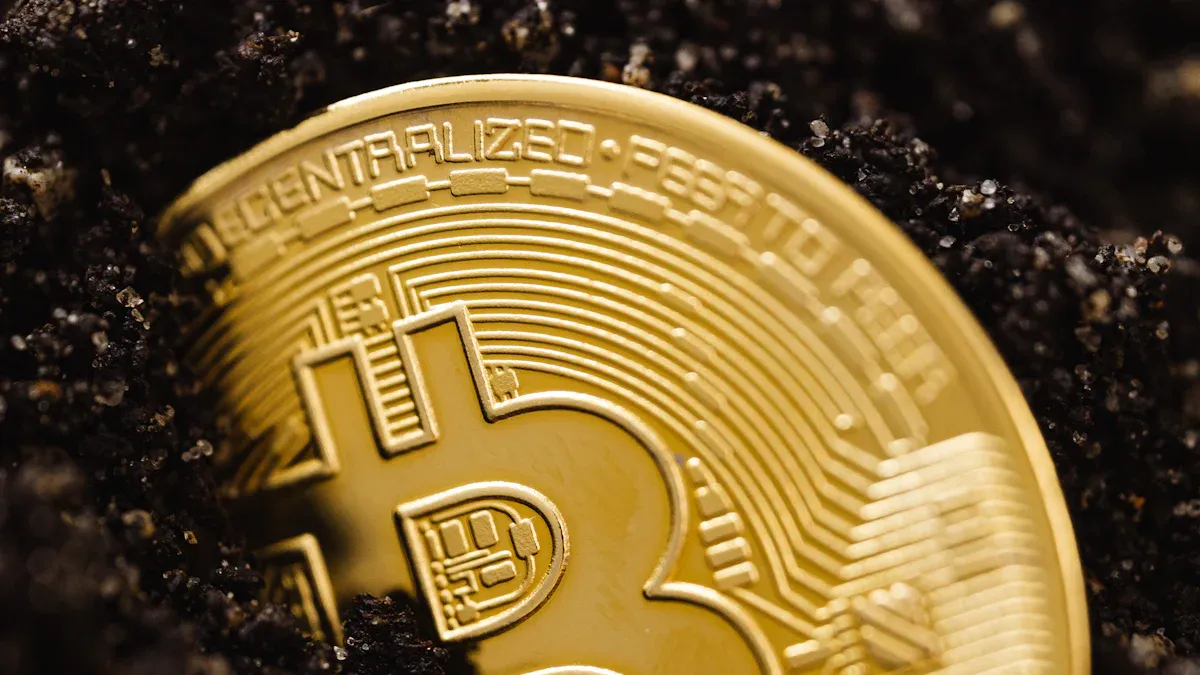How Blockchain is Enhancing HR and Recruitment Processes

Blockchain technology is reshaping how you approach HR and recruitment. It eliminates inefficiencies, enhances security, and builds trust in hiring processes. For example, companies using blockchain in HR systems have seen a 47% boost in operational efficiency and a 33% drop in costs. This technology also ensures data integrity, giving employees more control over their personal information. By creating immutable records, blockchain speeds up candidate verification and reduces payroll processing time by 27%. With these advancements, blockchain & HR: The Future of Secure Hiring? is no longer a question but a reality.
Key Takeaways
Blockchain helps HR work faster by automating tasks like checking resumes. This saves time and money.
Employers can rely on blockchain for safe and clear hiring. It keeps unchangeable records of candidate details.
Job seekers get their information checked faster, making hiring quicker and easier for them.
Blockchain can lower HR costs by up to 80%, making it cheaper and better.
Using blockchain in HR follows rules, keeps data safe, and stops fraud.
Blockchain & HR: The Future of Secure Hiring?

What is Blockchain Technology?
Blockchain is a digital ledger that records information in a secure and transparent way. It uses cryptographic algorithms and digital signatures to ensure data integrity. Each piece of information, or "block," is linked to the previous one, forming a chain. This structure makes it nearly impossible to alter or tamper with the data.
The technology operates on a decentralized network, meaning no single entity controls it. Instead, participants in the network verify and approve transactions through a consensus mechanism. This process ensures accountability and trust. Blockchain also supports smart contracts, which automate tasks like payments or approvals without human intervention. These features make blockchain ideal for industries like HR, where data security and accuracy are critical.
Why Blockchain Matters in HR and Recruitment
Solving inefficiencies in traditional HR systems
Traditional HR systems often involve manual processes that are time-consuming and prone to errors. Blockchain automates tasks like onboarding and credential verification, saving time and reducing costs. For example, resumes stored on blockchain are tamper-proof, ensuring their authenticity. Employers can instantly verify a candidate's qualifications, speeding up the hiring process.
Additionally, blockchain eliminates the need for intermediaries when sharing employee data. This direct exchange maintains data integrity and reduces delays. A case study by IBM found that using blockchain for background checks cut costs by 50% and improved efficiency by 80%. By addressing these inefficiencies, blockchain transforms HR operations into a more streamlined and effective system.
Building trust and transparency in hiring
Blockchain enhances trust in the hiring process by providing transparent and verifiable records. Employers can access a candidate's credentials stored on an immutable ledger, increasing confidence in their authenticity. Sensitive information, like certifications, is encrypted and distributed across multiple nodes, making it secure and tamper-proof.
This transparency benefits job seekers as well. You no longer need to worry about misrepresentation or delays in verifying your qualifications. Blockchain ensures that your credentials are instantly accessible and trustworthy. According to Deloitte, 33% of HR executives believe blockchain will play a crucial role in HR functions soon. This growing adoption highlights its potential to build a more reliable and transparent hiring ecosystem.
Applications of Blockchain in HR
Candidate Verification
Automating credential checks
You often face challenges when verifying candidate credentials. Blockchain simplifies this process by automating credential checks. It stores academic qualifications, certifications, and work history on an immutable ledger. This ensures that the information is accurate and tamper-proof. For example, companies using blockchain for verification have reduced hiring fraud by over 50% within the first year. Blockchain also eliminates the need for third-party verification services, making the process faster and more reliable.
Reducing costs and time in background checks
Traditional background checks can be expensive and time-consuming. Blockchain reduces these costs by up to 80%, allowing you to verify applicant details instantly. Approximately 87% of organizations struggle with credential verification, leading to poor hiring decisions. Blockchain addresses this issue by providing a secure and efficient solution. This not only saves time but also ensures that you hire the right candidate for the job.
Payroll Management
Smart contracts for automated payments
Managing payroll can be complex, especially for global teams. Blockchain simplifies this with smart contracts. These contracts automatically execute payments once predefined conditions are met. For instance, IBM reported an 80% reduction in payroll processing time after adopting blockchain. This automation minimizes errors and ensures timely payments, improving employee satisfaction.
Ensuring compliance with regulations
Compliance with payroll regulations is critical. Blockchain ensures that all transactions are transparent and auditable. This reduces compliance violations by 25% and decreases fraud risk by up to 60%. The technology also simplifies cross-border payments, with 37% of businesses already using blockchain for this purpose. By adopting blockchain, you can streamline payroll management while adhering to legal standards.
Employee Record Storage
Securing sensitive employee data
Employee data security is a top priority. Blockchain encrypts and stores this data, preventing unauthorized access or tampering. Companies like Maersk and Guardtime have successfully implemented blockchain to enhance data security. This ensures that sensitive information remains protected, giving you peace of mind.
Facilitating seamless data sharing
Sharing employee records across departments or with external parties can be challenging. Blockchain facilitates seamless data sharing by creating a transparent and secure system. Employees can control their own data and consent to its sharing, ensuring privacy. This approach streamlines HR processes and reduces administrative overhead.
Company | Implementation Description |
|---|---|
Maersk | Enhanced data security and integrity in HR systems through blockchain technology. |
Guardtime | Utilized blockchain to secure employee data and ensure its integrity, establishing a transparent system. |
Microsoft | Created a tamper-proof system for managing employee credentials and certifications. |
Walmart | Used blockchain to track employee work history securely and transparently. |
Blockchain & HR: The Future of Secure Hiring? is becoming a reality as more companies adopt this technology to improve efficiency and security in HR processes.
Global Recruitment
Simplifying cross-border hiring
Hiring across borders often involves complex processes, including verifying credentials, managing legal requirements, and ensuring compliance with local laws. Blockchain simplifies these challenges by creating a unified and secure platform for global recruitment. You can store and verify candidate credentials on a blockchain ledger, making them instantly accessible and tamper-proof. This eliminates the need for third-party verification services, saving time and reducing costs.
For example, blockchain reduces verification time by up to 75%, allowing you to onboard international employees faster. It also cuts administrative costs by up to 30%, making global hiring more affordable. Additionally, 65% of job seekers are more likely to apply for positions when their information is secured through blockchain. These benefits make blockchain a game-changer for companies looking to expand their talent pool globally.
Statistic | Value |
|---|---|
Projected market size for blockchain in recruitment by 2026 | USD 1.5 billion |
Reduction in verification time with blockchain | Up to 75% |
Cost savings on administrative processes | Up to 30% |
Job seekers more likely to apply if info is blockchain-secured | 65% |
Employers trusting blockchain-verified credentials | 70% |
Adhering to international standards
Global recruitment requires compliance with various international standards and regulations. Blockchain ensures that your hiring processes meet these requirements by providing a transparent and auditable system. Each transaction on the blockchain is recorded with a timestamp, making it easy to track and verify compliance.
For instance, blockchain simplifies cross-border payments by automating them through smart contracts. This ensures that payments adhere to local tax laws and labor regulations. Employers also trust blockchain-verified credentials, with 70% expressing confidence in their authenticity. By adopting blockchain, you can streamline global recruitment while maintaining compliance with international standards.
Blockchain & HR: The Future of Secure Hiring? is becoming a reality as companies leverage this technology to simplify global recruitment and adhere to international standards.
Benefits of Blockchain for HR Professionals and Job Seekers
Advantages for Employers
Enhanced efficiency and cost savings
Blockchain technology transforms HR processes by eliminating inefficiencies. You can instantly verify candidate credentials through a secure ledger, reducing the time spent on manual checks. Automated background checks also speed up hiring, saving operational costs. For example, companies using blockchain have reported up to 80% cost reductions in verification processes.
A comparative analysis highlights the difference:
Traditional Process | Blockchain-Enhanced Process |
|---|---|
Manual Verification | Instant verification of credentials through a secure ledger. |
Time-Consuming Background Checks | Automated checks reduce hiring time significantly. |
High Risk of Fraud | Immutable records minimize the risk of falsified qualifications. |
Reliance on Intermediaries | Direct access to verified data eliminates the need for third-party services. |
By streamlining recruitment, blockchain helps you save time and resources while improving hiring outcomes.
Improved data security and compliance
Data breaches are a growing concern in HR. Blockchain's encrypted and decentralized nature makes it significantly harder for hackers to access sensitive information. This ensures that employee records remain secure. Additionally, blockchain provides a transparent and auditable system, helping you meet compliance requirements effortlessly.
Benefit | Description |
|---|---|
Blockchain's encrypted and decentralized nature makes data breaches significantly more challenging. | |
Transparency | Immutable records ensure that all data is verifiable and trustworthy, enhancing trust in HR processes. |
Advantages for Job Seekers
Transparent hiring processes
Blockchain creates a transparent hiring ecosystem. You no longer need to worry about delays or misrepresentation in verifying your qualifications. Immutable records ensure that your credentials are trustworthy and instantly accessible. A survey of over 2,500 hiring managers revealed that 70% believe blockchain improves tracking of candidate certifications.
Faster credential verification
Traditional verification methods often delay hiring decisions. Blockchain eliminates this bottleneck by automating the process. Companies using blockchain have reduced hiring fraud by over 50% within the first year. This means you can enjoy a faster and more reliable hiring experience.
Tip: With blockchain, you gain control over your data, ensuring a smoother and more secure job application process.
Blockchain & HR: The Future of Secure Hiring? is no longer just a concept. It is a practical solution that benefits both employers and job seekers.
Real-World Examples and Future Potential

Companies Using Blockchain in HR
Examples of blockchain adoption in HR
Many companies are already leveraging blockchain to transform their HR processes. This technology has proven its ability to enhance efficiency and security.
A 2022 Deloitte report highlights that blockchain can reduce administrative costs in verification processes by up to 30%. This improvement builds trust and transparency in hiring.
IBM's case study reveals that blockchain reduced candidate verification time by 90%, streamlining recruitment significantly.
According to the HR Research Institute, companies using blockchain in their HR management systems experienced a 27% decrease in payroll processing time.
Deloitte also found that 56% of organizations are considering blockchain implementation to improve HR processes and data security.
These examples demonstrate how blockchain is reshaping HR operations, making them faster, more reliable, and cost-effective.
Future Trends in Blockchain for HR
Innovations and predictions for blockchain in HR
The future of blockchain in HR looks promising, with experts predicting significant advancements.
The global blockchain market is expected to reach $20 billion by 2024, signaling rapid growth and adoption in various industries, including HR.
Blockchain technology will likely enhance data security, reduce fraud, and simplify workforce management. These improvements will address critical challenges in HR.
Innovations in blockchain are set to solve issues related to identity verification and qualifications, ensuring a more transparent and efficient hiring process.
As blockchain continues to evolve, you can expect it to play a pivotal role in shaping the future of HR. Its ability to address inefficiencies and enhance trust makes it an essential tool for modern recruitment. Blockchain & HR: The Future of Secure Hiring? is no longer a question but a reality that will continue to grow.
Blockchain technology is revolutionizing HR and recruitment by addressing inefficiencies and enhancing security. Its applications, such as candidate verification and payroll management, streamline processes and reduce costs. For example, organizations using blockchain have seen a 47% increase in operational efficiency and a 33% reduction in costs, according to PwC. Job seekers also benefit from faster credential verification, with IBM reporting a 90% reduction in verification time.
The potential savings are immense, with PwC estimating $2 trillion in inefficiencies eliminated by 2030. As more companies adopt blockchain, HR professionals must explore its capabilities to stay competitive.

Blockchain & HR: The Future of Secure Hiring? is no longer a concept but a reality shaping the future of work.
FAQ
What is blockchain, and how does it work in HR?
Blockchain is a secure digital ledger that stores data in blocks linked together. In HR, it verifies credentials, automates payroll, and secures employee records. You can use it to streamline hiring processes and ensure data integrity.
How does blockchain improve candidate verification?
Blockchain automates credential checks by storing verified qualifications on an immutable ledger. You can instantly access and confirm a candidate's education, certifications, and work history. This reduces hiring fraud and saves time.
Is blockchain secure for storing employee data?
Yes, blockchain encrypts data and distributes it across a decentralized network. This makes it nearly impossible for hackers to tamper with or access sensitive employee information. You can trust it to protect personal and professional records.
Can blockchain simplify global recruitment?
Blockchain simplifies cross-border hiring by securely storing and verifying credentials. You can ensure compliance with international standards and reduce administrative costs. It also speeds up onboarding for international employees.
What are the cost benefits of using blockchain in HR?
Blockchain reduces costs by automating processes like background checks and payroll. You can save up to 80% on verification expenses and cut administrative overhead. Its efficiency helps you allocate resources more effectively.
Tip: Start small by integrating blockchain into one HR function, like payroll or verification, to see its benefits firsthand.
See Also
Transforming Hiring Processes Using MokaHR’s Advanced Recruitment Solutions
The Role of Applicant Tracking Systems in Recruitment Clarity
Boosting Hiring Efficiency Through MokaHR’s Tracking System
Maximize Recruitment Efficiency by Integrating MokaHR’s Compliance Tools
Streamlining Recruitment Processes with MokaHR’s Online System
From recruiting candidates to onboarding new team members, MokaHR gives your company everything you need to be great at hiring.
Subscribe for more information

